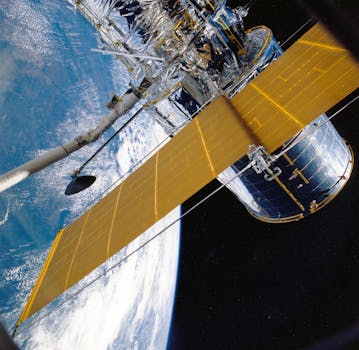Future of Satellites: The Next Frontier in Space Exploration and Connectivity
The future of satellites holds much promise for advancing space exploration and global connectivity. With advancements in technology, satellites are becoming more efficient, affordable, and accessible, paving the way for new opportunities in fields such as communication, navigation, and Earth observation.

Future of Satellites: The Next Frontier in Space Exploration and Connectivity
Future of satellites is an exciting and rapidly evolving field, with significant advancements being made in recent years. The use of satellites has become increasingly important for a wide range of applications, from communication and navigation to Earth observation and space exploration. As technology continues to improve, the future of satellites holds much promise for advancing our understanding of the universe and improving life on Earth.
Advancements in Satellite Technology
One of the most significant advancements in satellite technology is the development of smaller, more efficient satellites. These satellites, often referred to as smallsats or cube satellites, are designed to be more affordable and accessible than traditional satellites. They are also more versatile, with the ability to be used for a variety of applications, from communication and navigation to Earth observation and space exploration.
Another significant advancement in satellite technology is the development of satellite constellations. These constellations are made up of multiple satellites that work together to provide global coverage and connectivity. They have the potential to revolutionize the way we communicate and access information, particularly in remote or underserved areas.
Applications of Satellites
Satellites have a wide range of applications, from communication and navigation to Earth observation and space exploration. They are used to provide internet connectivity, transmit data, and facilitate communication between different parts of the world. They are also used to navigate and track objects, predict weather patterns, and monitor the environment.
Satellites are also being used to advance our understanding of the universe. They are used to study the Earth’s climate, monitor the environment, and track changes in the planet’s natural systems. They are also used to explore other planets and celestial bodies, such as Mars and the Moon.
Challenges and Opportunities
Despite the many advancements and applications of satellites, there are also challenges and opportunities that must be addressed. One of the main challenges is the issue of space debris, which poses a significant threat to the safety and sustainability of satellite operations. Another challenge is the need for more efficient and sustainable launch systems, which are critical for reducing the cost and environmental impact of launching satellites into space.
There are also many opportunities for innovation and entrepreneurship in the satellite industry. With the development of new technologies and applications, there is a growing need for skilled professionals and entrepreneurs who can help to drive the industry forward. This includes opportunities for companies and individuals to develop new satellite-based services and products, such as satellite-based internet connectivity and Earth observation services.
Conclusion
In conclusion, the future of satellites is an exciting and rapidly evolving field, with significant advancements being made in recent years. With the development of smaller, more efficient satellites, satellite constellations, and new applications, the potential for satellites to advance our understanding of the universe and improve life on Earth is vast. However, there are also challenges and opportunities that must be addressed, such as the issue of space debris and the need for more efficient and sustainable launch systems.
As we look to the future, it is clear that satellites will play an increasingly important role in shaping our world and advancing our understanding of the universe. With continued innovation and investment in the satellite industry, we can expect to see significant advancements in the years to come, from improved communication and navigation systems to new opportunities for space exploration and Earth observation.
Future of satellites is an exciting and rapidly evolving field, with significant advancements being made in recent years. The use of satellites has become increasingly important for a wide range of applications, from communication and navigation to Earth observation and space exploration. As technology continues to improve, the future of satellites holds much promise for advancing our understanding of the universe and improving life on Earth.
The development of satellite constellations is another significant advancement in satellite technology. These constellations are made up of multiple satellites that work together to provide global coverage and connectivity. They have the potential to revolutionize the way we communicate and access information, particularly in remote or underserved areas.
Satellite constellations are being developed by a number of companies, including SpaceX, OneWeb, and Amazon Kuiper Systems. These companies are working to launch thousands of satellites into orbit, which will provide high-speed internet connectivity to people around the world. This will have a significant impact on the way we communicate and access information, and will help to bridge the digital divide between urban and rural areas.
In addition to communication and navigation, satellites are also being used for Earth observation and space exploration. They are used to study the Earth’s climate, monitor the environment, and track changes in the planet’s natural systems. They are also used to explore other planets and celestial bodies, such as Mars and the Moon.
The use of satellites for Earth observation and space exploration is becoming increasingly important, as it allows us to gain a better understanding of the universe and the impact of human activity on the environment. It also provides valuable insights and data that can be used to inform decision-making and policy development.
However, the use of satellites also poses some challenges, such as the issue of space debris. Space debris refers to the accumulation of objects in orbit around the Earth, including old satellites, rocket parts, and other fragments. This debris can pose a significant threat to the safety and sustainability of satellite operations, and must be addressed through the development of more sustainable and responsible practices.
Another challenge facing the satellite industry is the need for more efficient and sustainable launch systems. Launching satellites into space is a complex and expensive process, and there is a growing need for more affordable and environmentally friendly options. This includes the development of reusable launch vehicles, such as those being developed by SpaceX and Blue Origin.
In conclusion, the future of satellites is an exciting and rapidly evolving field, with significant advancements being made in recent years. With the development of smaller, more efficient satellites, satellite constellations, and new applications, the potential for satellites to advance our understanding of the universe and improve life on Earth is vast. However, there are also challenges and opportunities that must be addressed, such as the issue of space debris and the need for more efficient and sustainable launch systems.
As we look to the future, it is clear that satellites will play an increasingly important role in shaping our world and advancing our understanding of the universe. With continued innovation and investment in the satellite industry, we can expect to see significant advancements in the years to come, from improved communication and navigation systems to new opportunities for space exploration and Earth observation.
The future of satellites is a future of endless possibility and discovery, and it will be exciting to see what the next few years hold for this rapidly evolving field. With the continued development of new technologies and applications, the potential for satellites to make a positive impact on our world is vast, and it will be important to continue to invest in and support the satellite industry as it continues to grow and evolve.
The importance of satellites cannot be overstated, and their impact will only continue to grow in the coming years. As we look to the future, it is clear that satellites will play a critical role in shaping our world and advancing our understanding of the universe. With their ability to provide global coverage and connectivity, they will help to bridge the digital divide and bring people and communities closer together.
In addition to their practical applications, satellites also have the potential to inspire and educate people around the world. They can be used to promote STEM education and careers, and to raise awareness about the importance of space exploration and the impact of human activity on the environment.
Furthermore, satellites can also be used to promote international cooperation and collaboration. By working together to develop and launch satellites, countries can build relationships and foster a sense of global community. This can help to promote peace and understanding, and to address some of the world’s most pressing challenges, such as climate change and sustainable development.
In conclusion, the future of satellites is a bright and exciting one, full of endless possibility and discovery. With their ability to provide global coverage and connectivity, inspire and educate people, and promote international cooperation and collaboration, satellites will play a critical role in shaping our world and advancing our understanding of the universe.
As we look to the future, it is clear that satellites will continue to evolve and improve, with new technologies and applications being developed all the time. This will have a significant impact on our world, and will help to address some of the challenges we face, from climate change and sustainable development to education and international cooperation.
Therefore, it is essential that we continue to invest in and support the satellite industry, and that we work to promote international cooperation and collaboration in the development and use of satellites. By doing so, we can unlock the full potential of satellites and create a brighter, more sustainable future for all.
The future of satellites is a future of endless possibility and discovery, and it will be exciting to see what the next few years hold for this rapidly evolving field. With the continued development of new technologies and applications, the potential for satellites to make a positive impact on our world is vast, and it will be important to continue to invest in and support the satellite industry as it continues to grow and evolve.




